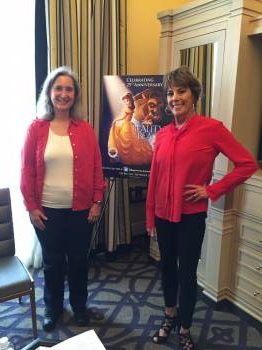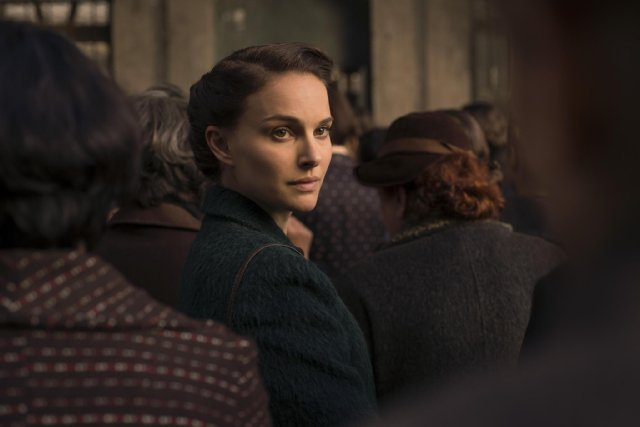Interview: Paige O’Hara, Belle in Disney’s “Beauty and the Beast”
Posted on September 26, 2016 at 1:12 pm

Broadway star Paige O’Hara provided the sweet singing and speaking voice for Belle in Disney’s classic “Beauty and the Beast,” celebrating its 25th anniversary with a gorgeous new DVD/Blu-ray edition. She is also an accomplished painter. I was delighted to get a chance to talk to her about her earliest and favorite singing roles and what it was like to appear in Disney’s most romantic musical fairy tale. She told me the exact moment when Belle falls in love – and she shared for the first time a lovely story about her favorite singer, Mary Martin.
What was the first song you ever learned to sing?
“Swing Low, Sweet Chariot,” because my nanny used to sing that.
And did you always love performing?
My family always knew I was an actor, I’ve always been an actress. They called me “Little Sarah Bernhardt” but I didn’t know I could really sing till I turned around 12 years old and did I did the “Peter Pan” song “I’ve Gotta Crow” for a competition. And they said “Oh my gosh! That voice is huge, you’ve got to sing.” And I started singing really around 12 years old.
Were there performers in your family?
No, not really. The only singer or musical person in my family was my aunt who sing with Dinah Shore. But she fell in love and got married and left the business. But my mom was my drama eacher. She did the acting and directing for the performing arts high school. So my mom was really my teacher, she was amazing.
She’s really brilliant but she wasn’t “method” in the fact that she didn’t over-intellectualize everything. She would actually try to be organic with the direction of the characters. So the realism of my characters I think came from her teaching me about that. Do you remember the character Auntie Mame? She was like that, with the looks of Carole Lombard!
What was the first musical play you saw?
I think the first musical play I saw I was in. It was “The Wizard of Oz.” I was like a little this background munchkin person but then the next year I got to play Cinderella so that was fun.
You came to New York after high school to be on Broadway?
Of course! I actually turned down a full scholarship at the Cincinnati Conservatory to go right to New York, but I was ready. I had been in this school with my mom and I’d been acting my whole life. It’s not really the norm for most people and I don’t really recommend it unless you’re in this circumstance that I was in. I was just ready to do it and I was lucky. I had to do those watercolors and sell them on the street to pay my rent. But within one year I had my equity card and created Della in “Gift of the Magi” on Broadway. So it was really cool.
What was your audition song for “Beauty and the Beast?”
I sang “Heaven Help My Heart” from Chess. That’s a great, great song because it shows range.
It’s a very challenging song.
I played the lead in “Chess” so I knew it really well and from the reaction from the casting director, I could tell I was getting a callback. So we went through five auditions and every audition had more people, two people, four people, all of them including Jeffrey Katzenberg. So it was crazy and it was over a span of two weeks and my husband had proposed to me, a day before I got the job. The next day I walked into the apartment and there was a message from David Friedman who was the musical director for Beauty and the Beast saying “Paige it’s David, we’ve got to get together and set keys” and I was like, “My God, my God!”
That’s how I found out. And literally like two seconds later my agent called and I said, “I know!!” It was just crazy, a pretty exciting week!
Tell me about creating the character of Belle.
I always say there’s a lot of us in Belle. We all share the role, Linda Woolverton who wrote it, James Foster and Mark Swain who animated it and then me. So it’s kind of funny that a lot of people said that the Linda Woolverton and I could be sisters. She is very much like me and like Belle she loves books and reading and I pushed that. Belle has a sense of humor and she is the oldest Disney Princess. She’s in her early 20s. They had never done it before; the other princesses are teenagers. She is an old soul, too, and her heart has got to be evident throughout the entire film; you’ve got to feel her heart. And I appreciate it more now, 25 years later, what she did being willing to give up her life for her father. I just love the fact that Belle was her own person. She wasn’t looking for a man and she had the guts to stand up to Gaston.
You were lucky enough to work with your fellow actors in recording, which is not always the case in animated films.
It was fun working with Richard Wild because he was a friend and I had known him for years, so I felt I could take it pretty far. We had the written words and everything but they said, “If you want to expand a little bit on the dialogue, you can.”
Robby Benson and I were together, too. My whole character came to fruition when Robbie was hired because I was hired a month before they found him. It was instant chemistry. I’m such a fan because I was one of the many to have crushes on him. We were the same age when he was doing his films as a teenager and he would love hearing that but he would also love the fact that I loved him in “One on One” because I’m a diehard NBA fan. I think it’s kind of disappointing he didn’t have his own song in the movie but what an actor, oh my gosh!
Belle’s feelings change a lot over the course of the story.
Yes, absolutely, from being terrified to falling in love with him. And I know the moment she falls in love with him. When the little birds jump up on this paw and she smiles and she touches him and runs behind the tree. We talked about that with the directors. That’s the moment when she realizes she’s never felt this before, and her heart is going and she knows that… She knows she’s falling in love with him at that point.
Did you meet Angela Lansbury?
Yes! I was a huge fan of Angela’s and when I came to New York she was starring in “Gypsy” on Broadway. I paid to see it once. I was so broke but then I sneaked in at intermission and came back again and again and again to hear her sing “Rose’s Turn.” Every night the audience would stand and stop the show. So it was really cool to talk to her. I pointed out that she played Mama Rose as if she was the child and Louise was the adult. She looked at me and she said, “You were the first person that ever said that and that’s exactly my intention”. And I was like, cool. I got it, I understand her theory in that role because she’s the most lovable of all the women that played that role. Because that role can be very abrasive but she was something else when she did that.
When she recorded “Beauty And The Beast” she spent all night traveling. She had gotten stuck in another city and was on the planes all night long before the session. They said they could cancel it and she could do it another day and she said, “Oh no, I’ll be there.” She gets in and she’s very nervous. She said, “I don’t know, that song has so much line, I don’t know if I can do that anymore,” they said, “Of course you can,” and lo and behold we have the whole orchestra, everybody’s there, and she’s behind the headset, and did it in one take. One take, one take and people were crying, people were crying. It was just unbelievable! It’s crazy!
And you’ve continued to play Belle into some other versions.
The thing I like about Belle, she never ages and I do. I played her again in “Enchanted Christmas” and “Belle’s Magical World.”
You have appeared on stage in so many classic musicals. Do you have a favorite?
One of my favorites of course is “The Sound of Music.” Mary Martin’s granddaughter, Heidi Hagman, Larry Hagman’s daughter, played Liesel in our show. She told Mary that I was a huge fan of hers. She said, “This Paige girl is like crazy for you, Grandma.” I got this big box sent to the theater she had pulled out her Ordinary Couple dress that was in the museum and the note said, “I want you to wear this. Love, Mary. I hear you are a lot like me.” I still have the note. I wore the dress and it fit perfectly and then I sent it back. That was like the most amazing thing. And she set it up for me to talk over phone with the real Maria.
What do you hope families will talk about after they see the movie?
It’s timeless. It’s one film where every single factor came together. I get so much fan mail from of little girls because they don’t feel like a geek anymore because Belle loves to read. The message is just timeless, it’s relevant now. Beauty comes from within.



